www.aljazeerah.info
News, July 2013
Archives
Mission & Name
Conflict Terminology
Editorials
Gaza Holocaust
Gulf War
Isdood
Islam
News
News Photos
Opinion Editorials
US Foreign Policy (Dr. El-Najjar's Articles)
www.aljazeerah.info
|
Editorial Note: The following news reports are summaries from original sources. They may also include corrections of Arabic names and political terminology. Comments are in parentheses. |
Millions of Egyptians Continue Protests Against the Coup, Calling for Reinstatement of Morsi
Al-Jazeerah, CCUN, July 12, 2013
Millions of Egyptian supporters of the ousted President, Muhammed Morsi, have taken to the streets all over Egypt, condemning the military coup and demanding the reinstatement of President Morsi.
Supporters of Morsi have stayed permanently at 'Adawiya Square, in Cairo. The numbers increase at night and during the collective Friday prayer.
They insist to continue their protests until the release and reinstatement of the ousted President, who was the first democratically-elected president of the country.
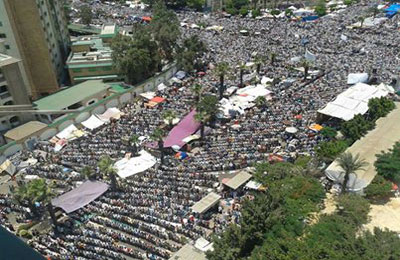 |
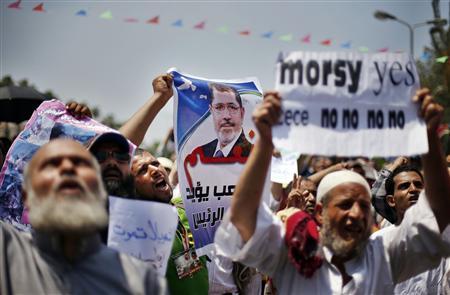 |
| Supporters of the ousted Egyptian President, Morsi, performing Friday prayer at Adawiya Square, Cairo, July 12, 2013 | Supporters of the ousted Egyptian President, Morsi, at Adawiya Square, Cairo, July 12, 2013 |
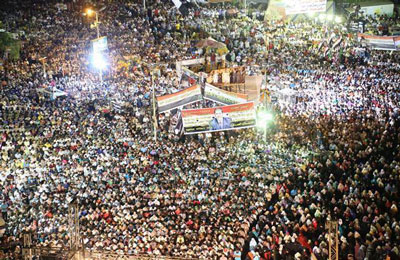 |
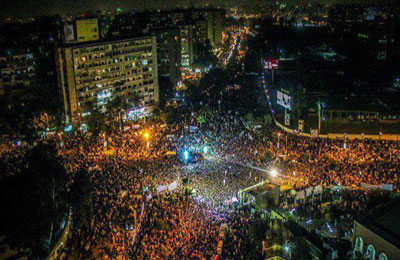 |
| Supporters of the ousted Egyptian President, Morsi, at Adawiya Square, Cairo, July 11, 2013 | Supporters of the ousted Egyptian President, Morsi, at Adawiya Square, Cairo, July 11, 2013 |
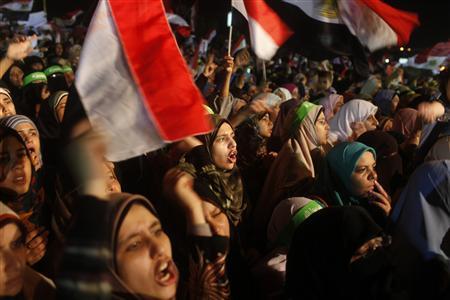 |
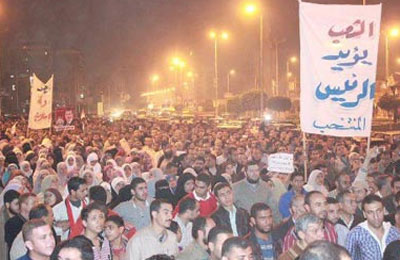 |
| Supporters of the ousted Egyptian President, Morsi, at Adawiya Square, Cairo, July 11, 2013 | Supporters of the ousted Egyptian President, Morsi, in Alexandria, July 11, 2013 |
Egypt's turbulence leaves four question marks to world
BEIJING, July 12, 2013 (Xinhua) --
Egypt's interim President Adli Mansour have recently launched a series of measures to head off violence and ease tensions, but the political situation in the country is still unstable.
Analysts said there are four question marks still overshadowed the political prospect of Egypt, and only if all sides give up violence and open up negotiation can the country avoid slipping into continuous turbulence.
QUESTION ONE: HOW MORSI WILL BE HANDLED?
Since Mohamed Morsi was overthrown by the military, his whereabouts had been unknown until Wednesday, when the Egyptian authorities finally released some latest information about him.
Foreign ministry spokesman Badr Abdelatty told reporters that the deposed president was currently being held in a "safe place, for his safety."
Analysts said under the turbulent situation, the Egyptian military may not let Morsi "show up" too early. Moreover, the military based its reason for his ouster on his "poor performance" in dealing with domestic crisis in the past year.
They said the way the military and transitional government handle Morsi will affect Egypt's political negotiation process, because Morsi didn't violate any law as a president elected in legitimate process.
QUESTION TWO: HOW WILL THE MUSLIM BROTHERHOOD STRIKE BACK?
The Egyptian authorities on Wednesday ordered the arrest of Muslim Brotherhood leader Mohamed Badie and several other senior members, accusing them of agitating violence in Cairo.
After the downfall of Morsi, Badie called on all his supporters to pledge their lives to safeguard him. The Brotherhood kept organizing large demonstrations to oppose the transitional government, calling for the restoration of Morsi's position as president.
Analysts said there are two options for the Brotherhood: to persist in rebellion or compromise and expect to make a comeback in the future parliamentary and presidential elections.
Choosing the first option will incur oppression from the military, which will do no good to the stabilization of Egypt's situation as well as the Brotherhood's political future.
However, judging from the current situation, the Brotherhood will not "swallow insult and humiliation silently" in short term.
QUESTION THREE: WILL THE POLITICAL TRANSITION BE SMOOTH?
Mansour appointed the leading figure of the National Salvation Front (NSF), Mohamed ElBaradei, as vice president for foreign affairs and ex-finance minister Hazem al-Beblawi as prime minister in the transitional government. He has also set a timetable for elections by early next year.
These measures sent off some positive signals for reconciliation, but it is unknown whether the Islamist forces represented by the Brotherhood will acknowledge these moves.
Reports said Beblawi intent to cooperate with the Brotherhood in the makeup of his interim government, and promised the group several minister positions. However, a spokesperson of the Brotherhood said the organization did not accept the "olive branch" held out by the transitional government.
Local media said Beblawi expected to unite the Islamist forces to form his cabinet, but the arrest order of Badie made the wish hard to fulfill in short term.
QUESTION FOUR: WHAT'S THE FUTURE OF EGYPT'S DEMOCRACY?
The Egyptians overthrew the regime of Hosni Mubarack in February, 2011 in the name of democracy, and now an elected president was ousted again.
Analysts said the ouster set setbacks for democracy and hurt the Egyptian people's confidence in democracy.
Sharp conflicts between secular and religious forces exist in Egypt. After Morsi took office, the Islamist forces have gained strength in the national organizations at a pace too fast for them to address the needs of the secular forces, which led to their collapse.
The ouster of a legitimate president by the military and opposition has laid hidden troubles for Egypt's future democracy.
Analysts said the only way out of the current crisis is that all parties in Egypt should stop violence as soon as possible and show their sincerity for political dialogue.
===========================================
Egypt braces for more protests, prays for calm
By Yasmine Saleh and Mike Collett-White
Friday, July 12, 2013, 8:09 am EDT
CAIRO (Reuters) -
Supporters of ousted President Mohamed Mursi called for protests on Friday and Egyptians prayed there would be no repeat of clashes that have killed more than 90 people in the last week in the bitterly divided Arab nation.
More than a week after the army toppled Egypt's first elected leader on a wave of demonstrations, Mursi's Muslim Brotherhood movement wants people to join it on the streets to push for his reinstatement, which now looks like a lost cause.
The streets of Cairo were quiet on Friday morning, with separate demonstrations by Mursi supporters and opponents expected later in the day, the weekly Muslim prayer day.
Officials say Mursi is still being held at the Republican Guard compound in Cairo, where troops killed 53 Islamist protesters on Monday in violence that intensified anger his allies already felt at the military's decision to oust him.
Four members of the security forces were also killed in that confrontation, which the military blames on "terrorists". Mursi's supporters call it a massacre and say those who died were praying peacefully when troops opened fire.
Many of Egypt's 84 million people have been shocked by the shootings, graphic images of which have appeared on state and private news channels and social media. The incident occurred just three days after 35 people were killed in clashes between pro- and anti-Mursi demonstrators across the country.
"It's a very hard time for Egyptians, to see footage of blood and violence during the holy month of Ramadan, and everyone I speak to says the same thing," said Fateh Ali, a 54-year-old civil servant in Cairo.
"I really hope the situation gets resolved soon. I don't think we can afford this economically or psychologically."
The Brotherhood contends it is the victim of a military crackdown, evoking memories of its suppression under Hosni Mubarak, whose 30-year rule collapsed in an uprising in 2011.
But many of its opponents blame Islamists for the violence, and some have little sympathy for the demonstrators who died, underlining how deep the fissures in Egyptian society are.
The unrest has also raised fear over security in the lawless Sinai peninsula bordering Israel and the Palestinian Gaza Strip. One Egyptian policeman was killed and another wounded early on Friday when militants fired rocket-propelled grenades at checkpoints in the Sinai town of El Arish.
Egyptian state media said police arrested three Palestinian militants for attempted attacks in Sinai.
VIGIL, SONGS FOR THE DEAD
Outside the Rabaa Adawiya mosque in northeastern Cairo, thousands of Brotherhood supporters gathered late on Thursday to mourn the dead in Monday's violence, the deadliest since Mubarak was toppled, apart from a 2012 soccer stadium riot.
Women wailed and men cried as they watched a large screen showing graphic footage of hospital scenes immediately after the shooting, with corpses on the floor and medics struggling to cope with the number of bloodied casualties being carried in.
Hundreds of Egyptian flags fluttered in the evening breeze. Songs of defiance were sung. Many thousands of Islamists have camped out in the area, braving searing heat and, since Wednesday, daytime fasting during Ramadan.
It has become the de facto base of the Brotherhood, whose leaders live under the threat of detention after the public prosecutor ordered their arrests earlier in the week.
Judicial sources say authorities are expected to charge Mursi, possibly for corruption or links to violence. Prosecutors are also taking a fresh look at an old case over a 2011 prison break when Mursi was among Brotherhood figures who escaped after being rounded up during anti-Mubarak protests.
The detentions and threats of arrest have drawn concern from the United States, which has walked a semantic tightrope to avoid calling Mursi's ouster a military coup.
U.S. law bars aid to countries where a democratic government is removed in a coup. Washington, which gives Egypt's military $1.3 billion in aid each year, has said it is too early to say whether Mursi's removal by the army meets that description.
The army said it was enforcing the nation's will after millions of people, fed up at economic stagnation and suspicious of a Brotherhood power grab, took to the streets at the end of June to demand his resignation.
State Department spokeswoman Jen Psaki said on Wednesday Mursi's government "wasn't a democratic rule".
Her words were warmly received by the interim government and swiftly denounced by the Brotherhood. On Thursday, Psaki expressed concern over the crackdown on Brotherhood leaders.
"If politicized arrests and detentions continue, it is hard to see how Egypt will move beyond this crisis," she said.
ALARM OVERSEAS
Crucial to longer-term stability will be holding parliamentary and presidential elections, which the transitional authorities are hoping to achieve in a matter of months.
Adli Mansour, the interim president named by the general who removed Mursi, has announced a temporary constitution, plans to amend it to satisfy parties' demands and a faster-than-expected schedule for parliamentary elections in about six months.
He has named liberal economist Hazem El-Beblawi as interim prime minister. Beblawi told Reuters he would start contacting candidates for ministerial posts on Sunday and Monday, with a view to swearing in a cabinet next week.
Negotiations are difficult, with the authorities trying to attract support from groups that range from secularists to ultra-orthodox Muslims, nearly all of whom expressed deep dissatisfaction with elements of the interim constitution.
Underlining the level of concern overseas at Egypt's crisis, two U.S. Navy ships patrolling in the Middle East moved closer to Egypt's Red Sea coast in recent days, in what appeared to be a precautionary move following Mursi's ouster on July 3.
The United States often sends Navy vessels close to countries in turmoil in case it needs to protect or evacuate U.S. citizens or give humanitarian assistance.
Rich Gulf states have thrown Egypt a $12 billion lifeline in financial aid, which should help it stave off economic collapse.
More than two years of turmoil have scared away tourists and investors, shriveled hard currency reserves and threatened Cairo's ability to import food and fuel.
(Additional reporting by Alexander Dziadosz, Maggie Fick, Sarah McFarlane, Mike Collett-White, Tom Perry, Peter Graff, Ali Saed, Seham el-Oraby, Shadia Nasralla and Tom Finn in Cairo and Andrea Shalal-Esa and Lesley Wroughton in Washington; Writing by Mike Collett-White and Peter Graff; Editing by Alistair Lyon)
=============
Egypt welcomes U.S. remarks on Mursi; food stocks dwindle
By Yasmine Saleh and Sarah McFarlane
Thu Jul 11, 2013 4:50pm EDT
CAIRO (Reuters) -
Egypt's interim rulers welcomed on Thursday remarks from the U.S. State Department describing the rule of toppled leader Mohamed Mursi as undemocratic, read in Cairo as a signal that Washington will not cut off its $1.5 billion in annual aid.
In a stark illustration of the desperate state of Egypt's economy, a former minister from Mursi's ousted government said Egypt had less than two months' supply left of imported wheat, revealing a far worse shortage than previously disclosed.
The army's removal of Egypt's first freely elected leader last week, after millions took to the streets to protest against him, has left the Arab world's most populous country polarized by divisions unseen in its modern history.
Violence between supporters of Mursi and soldiers at a military compound this week has deepened the fissures.
Washington has been treading a careful line. U.S. law bars aid to countries where a democratic government is removed in a coup. So far Washington has said it is too early to say whether the Egyptian events meet that description.
Nevertheless, State Department spokeswoman Jen Psaki said on Wednesday Mursi's government "wasn't a democratic rule".
"What I mean is what we've been referencing about the 22 million people who have been out there voicing their views and making clear that democracy is not just about simply winning the vote at the ballot box."
The new U.S. remarks were warmly received by the interim government and swiftly denounced by Mursi's Muslim Brotherhood.
Foreign Ministry spokesman Badr Abdelatty said the comments reflected "understanding and realization about the political developments that Egypt is witnessing in recent days, as embodying the will of the millions of Egyptians who took to the streets".
Brotherhood spokesman Gehad Haddad said the remarks showed American hypocrisy: "There is no way the Egyptian army would have gone through with this coup if it would not have been sanctioned by the U.S."
WHEAT SUPPLIES
Two and a half years of political turmoil has left Egypt on the brink of economic collapse, scaring away tourists and investors, shriveling hard currency reserves and threatening its ability to import food and fuel for its 84 million people.
Speaking to Reuters in a tent at a vigil by thousands of Mursi supporters, the ousted president's supply minister, Bassem Ouda, revealed that government stocks held just 500,000 tonnes of imported wheat.
Egypt, the world's biggest buyer, usually imports about 10 million tonnes of wheat a year, half of which is given out by the state in the form of subsidized bread sold for less than 1 U.S. cent a loaf.
The imported wheat stock figure, previously a closely guarded secret, means Egypt will need to urgently start spending a $12 billion financial aid lifeline it has been given in the past two days by Saudi Arabia, the United Arab Emirates and Kuwait, rich Gulf states that welcomed Mursi's downfall.
Egypt had not bought any imported wheat since February, its longest absence from the market in years, until the eve of Mursi's downfall when it bought 180,000 tonnes.
State grain buying agency GASC said on Thursday it was unlikely to buy any more soon due to the increase in prices and availability of stocks in Egypt.
"I am confident we have enough stocks and hence it is unlikely we buy from the international market soon, especially with the current increase in prices," vice chairman Mamdouh Abdel Fattah told Reuters.
The United Nations Food and Agriculture Organization said in a report that Egypt risked serious food security problems if insecurity and a shortage of foreign currency hindered imports.
"I think the aim of the Arab countries is to make sure Egypt doesn't fail with respect to food security and financial commitments with the international banking system, so I would think they will push to get the aid through quickly," said Kisan Gunjal, economist and food emergency Officer at the FAO.
LEADERS' ARRESTS
The United States and United Nations expressed concern over the arrest and detention of Muslim Brotherhood leaders, including Mursi, who officials say is held at the Republican Guard compound in Cairo, scene of deadly clashes on Monday.
"If politicized arrests and detentions continue, it is hard to see how Egypt will move beyond this crisis," Psaki told a daily briefing on Thursday.
On Wednesday, Egypt's public prosecutor ordered the arrest of Brotherhood leader Mohamed Badie and other senior Islamists, accusing them of inciting violence on Monday when 53 Mursi supporters and four members of the security forces were killed in a dawn clash near the compound.
Mursi's supporters say those killed were peacefully praying when fired upon. The army says terrorists provoked the violence by attacking its troops.
Amid the acrimony, Adli Mansour, the interim president named by the general who removed Mursi, has moved briskly to implement an army "road map" to restore civilian rule.
This week he announced a temporary constitution, plans to amend it and a faster-than-expected schedule for parliamentary elections in about six months.
He also named 76-year-old liberal economist Hazem el-Beblawi as interim prime minister. Beblawi held his first meetings with political leaders on Wednesday and told Reuters that he expected the transitional cabinet to be in place early next week.
Negotiations are difficult, with the authorities trying to attract support from groups that range from secularists to ultra-orthodox Muslims, nearly all of whom expressed deep dissatisfaction with elements of the interim constitution.
Thousands of Brotherhood supporters have maintained a round-the-clock vigil near a mosque in northeast Cairo demanding Mursi be reinstated, an aim that now seems in vain.
The start of the Ramadan Muslim fasting month has done little to dampen the Brotherhood protest. Supporters are sheltering in tents from the summer heat during daylight hours when they are forbidden to eat or drink, and coming out in greater numbers in the evening.
They called for more protest marches on Friday, the Muslim prayer day, while the anti-Mursi Tamarud group invited supporters to celebrate Ramadan in Tahrir Square.
Fighting between the sides killed 35 people last Friday, but Cairo and other cities have been calmer since Monday's clash.
The Tamarud youth movement that led the huge protests against Mursi was one of the liberal groups to sign a statement issued on Thursday urging both sides to remain peaceful.
Both sides in Egypt have become more anti-American in recent weeks. Mursi's opponents say President Barack Obama's administration supported the Muslim Brotherhood in power, while Mursi's supporters believe Washington was behind the plot to unseat him.
"Obama supports democracy, but only if it goes to those who aren't Islamists," heavily bearded Mursi supporter El-Sayyed Abdel Rabennabi said at the Brotherhood vigil.
On Tahrir Square, where Mursi's opponents gather, the animosity is no less fierce.
"The Brotherhood are fighting us in the streets, fighting to take back power, and America is sitting on the fence," said aircraft mechanic Tawfiq Munir.
(Additional reporting by Alexander Dziadosz, Maggie Fick, Mike Collett-White, Tom Perry, Peter Graff, Ali Saed, Seham el-Oraby and Shadia Nasralla; Writing by Peter Graff; Editing by Alison Williams)
Fair Use Notice
This site contains copyrighted material the
use of which has not always been specifically authorized by the copyright
owner. We are making such material available in our efforts to advance
understanding of environmental, political, human rights, economic,
democracy, scientific, and social justice issues, etc. We believe this
constitutes a 'fair use' of any such copyrighted material as provided for
in section 107 of the US Copyright Law. In accordance with Title 17 U.S.C.
Section 107, the material on this site is
distributed without profit to those
who have expressed a prior interest in receiving the included information
for research and educational purposes. For more information go to: http://www.law.cornell.edu/uscode/17/107.shtml.
If you wish to use copyrighted material from this site for purposes of
your own that go beyond 'fair use', you must obtain permission from the
copyright owner.
|
|
|
|
||
|
||||||


